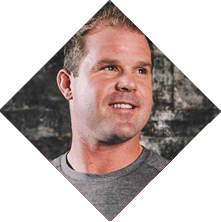
-

 KELLY STARRETTFOR THE FIRST TIME IN POLAND
KELLY STARRETTFOR THE FIRST TIME IN POLAND -

 24-25.06.2017GET KNOWLEDGE
24-25.06.2017GET KNOWLEDGEINTERNATIONAL
FASCIA & MOBILITY SUMMIT -
 24-25.06.2017DON'T WAIT, SUBSCRIBE
24-25.06.2017DON'T WAIT, SUBSCRIBEINTERNATIONAL
FASCIA & MOBILITY SUMMIT
DON'T WAIT
TO THE CONFERENCE BEGINS IN
Learn more about ifm
-
 IFM SUMMIT...invites the cooperation of best theorists and practitioners
IFM SUMMIT...invites the cooperation of best theorists and practitioners
-
 IFM SUMMIT…is a 2-day event packed with lectures and workshops hosted by the world’s most renowned experts
IFM SUMMIT…is a 2-day event packed with lectures and workshops hosted by the world’s most renowned experts
-
 IFM SUMMIT...is not an ordinary conference – it is a meeting place for all those who are passionate about sports
IFM SUMMIT...is not an ordinary conference – it is a meeting place for all those who are passionate about sports

Understand your body. Be smart and effective while exercising. Regenerate quicker, do away with pain and injury. Find out how to help others improve their fitness and boost their sports performance.
Become a better coach, physiotherapist, athlete. Learn from the best - join the IFM SUMMIT community.

SPEAKERS
UNMATCHED EXPERTS IN THEIR RESPECTIVE FIELDS


dr Remigiusz Rzepka
Highly valued by numerous athletes, one of Poland’s best experts in objective physiotherapeutic assessment. ↓
dr Ryszard Biernat
Physical therapist and biomechanic. Trains physical therapists applying his proprietary methods. Founder of the Biernat Sports and Rehabilitation Center in Olsztyn. ↓
dr n. med. Tomasz Chomiuk
Physical therapist, founder of Mobilemed – a nationwide network of mobile physiotherapists. Graduate of the Warsaw Medical University and Warsaw Physical Education Academy. ↓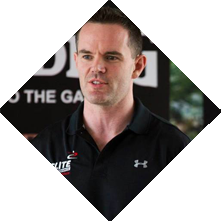
Karl Gilligan
Irish conditioning and strength training coach. Member of NSCA (National Strength & Conditioning Association), holder of the CSCS (Certified Strength & Conditioning Specialist) certificate. ↓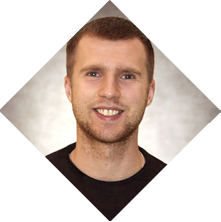
Artur Pacek
Artur Pacek - Co-founder of the Strength & Conditioning Education Center - SCEC and GETBETTER become a winner. ↓
Agata Korzemiacka
A volcano of energy and a mine of knowledge. Functional training is her primary professional focus and a passion of her life. An electro-radiologist by profession, Korzemiacka shows great love for training. She is an author of numerous teaching curricula, an acupuncturist, and a mentor for those practicing sports professionally and those considering it a recreational pastime. ↓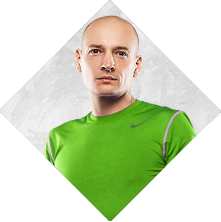
Piotr Ciebiera
Graduate of the prestigious Open Mind Therapy Fitness School, in which the best personal coaches, fitness trainers and movement therapists study. ↓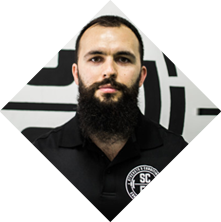
Mirosław Babiarz
Mirosław Babiarz Founder and co-creator of SCEC. He was building his experience in the USA, where he began his professional career as an assistant strength and conditioning coach, as well as an assistant basketball coach at Mercer County College in New Jersey, working with athletes practicing soccer, basketball, tennis, baseball and softball. ↓COOPERATION
CONTACT US
Would you like to become our sponsor / patron or co-operate with us?
collaborate with us...AGENDA
FIND OUT WHAT WE HAVE IN STORE FOR YOU
June 24, 2017 – SATURDAY
07:30am - 09:30am
Official opening ceremony

Over 80% of the population complain about recurring lower back pain. Modern civilization and our sitting lifestyle are not factors that contribute to maintaining good health. When we meet the customer/patient for the first time in order to establish a training plan, it should be one of our main priorities to identify, in the course of pre-training diagnostics, which type of a faulty posture we will be dealing with. We need to know whether it is related to locomotor system restrictions, or perhaps visceral or psychosomatic disorders. Evaluation of the patient’s health will be a determining factor in deciding whether the training plan devised is to be treated in its entirety as a therapy, or whether elements of the therapy may be incorporated into the training plan as an addition of preventive nature.
The lecture will focus on the following issues:
- Characteristics of faulty postures
- Analysis of biomechanical, as well as fascia and muscle-related posture disturbance patterns
- Visceral disorders and their impact on posture
- Visceral motor reflexes affecting faulty postures

Lack of strength is one of the most frequent reasons of movement disorders that athletes suffer from. Weakness of one part of muscles results in the mobility, movement, stretching ability or the movement pattern being disturbed, as the body, in order not to suffer an injury, will revert to the so-called protection mode. In such a case, even relaxing the tense tissue fails to bring about the long-term effect desired. In such a case, it is strength training that is the best solution, as it not only increases the range of movement and improves the popular movement pattern, but will also facilitate (by boosting strength) maintaining the newly acquired movement range.
We may stretch, mobilize and relax our muscles. However, if we are not strong enough, the highly desired effect will remain unattainable. Our body will get back to its previous condition, or will suffer from an injury, as the newly created movement range or body position will not be strong enough to prevent overloading.
During the lecture, the participants will learn:
- that strength and strength training are the foundation on which other movement features and physical skills are based
- how to increase and maintain greater movement range by building strength
- how to distinguish correct strength training that is a remedy to practically all mobility and flexibility-related problems caused by incorrect workout

Simultaneously, over the past two decades, we have been observing a considerable growth of interest in physical activity, active recreation and a healthy lifestyle. The phenomenon prevails amount numerous layers of the society. However, many of those people fail to attach - both consciously or not - sufficient attention to the correct operation of their pelvic girdle, and to the activation of their gluteal muscles, neglecting this specific area of training-related methodology.
The following issues will be referred to during the lecture:
- Etiology of pelvic girdle’s functional disorders
- Unbalance of the group of gluteal muscles and the hip flexor muscle - diagnosing disorders and examples of correction strategies
- Biomechanical axis of the lower limb - description and identification of problems and its impact on the upper body
- Methods of activating and restoring structural balance of gluteal muscles

Generating energy in both everyday and sports activity, while relying on the foundation of movement optimization, is another layer of the pyramid. At this stage the Functional Capacity Screen parameters are applied as well.
Within this meaning, FCS covers 4 main areas:
- Mechanics
- Ability to maintain proper posture
- Explosive activity vs. gravity
- Using cumulated elastic energy in the course of physical activity

During the lecture, you will be provided with answers, inter alia, to the following questions:
- How to reach the peak of our physical fitness and well-being?
- Should men and women train differently?
- Where is the limit of our performance?
- How do physical activity and fitness affect our health and well-being?
- What should our nutrition look like?

June 25, 2017 – SUNDAY

During the workshop you will find out, inter alia:
- how to identify the most frequent movement errors that deprive you of speed, power, endurance and strength
- how to identify disorders causing pain, as well as muscle- and fascia-related dysfunction
- how to restore function to your joints and tissues
- how to protect your body from injury and optimize sporting performance

During the workshop, you will learn how to properly identify priority actions while coming up with a training program, and how to determine the scope thereof. You will be provided with practical insights into when and to what extent corrective measures should be implemented. You will be acquainted with a logical algorithm enabling you to apply corrective exercise strategies, with the following taken into consideration:
- corrective exercise qualification
- selection of optimized exercises boosting and restoring mobility and movement range, reeducating the movement pattern coordination and ensuring both functional and movement-related progression
- the so-called traffic light pattern, i.e. planning your physical activity with permitted, limited, modified and not recommended exercises identified for each stage of work with our customer/patient

Workshop participants will be acquainted with the following:
- detailed weight exercising techniques
- they will work how to work on the fascia, as well as on boosting and maintaining their flexibility by strength training.

- ability to assess the neutral position of the elements of the shoulder complex (shoulder blade, humerus, collar bone) - “with the correct neutral position, the movement may be correct as well”
- correct range of the outward and inward rotation of the shoulder joint
- priorities in boosting efficiency of the shoulder complex - a. upper rotation of the shoulder blade, b. posterior inclination, c. lowering of the shoulder blade, d/ efficient rotators
- command to activate the shoulder blade muscles
- train the shoulder blade plane - errors, examples of exercises
- serratus anterior - a muscle of priority importance - activation examples
- quadratus femoris-ascending part - a muscle of priority importance - activation examples
- rotator training - examples of exercises
- shoulder - hip - examples of exercises
- should we exercise single- or double-handedly?


- neutral position of the lumbar section, pelvis and hip joint
- assessment of the range of outward and inward rotation of the hip joint
- Patrick test - analysis
- TFL and ITB - tension assessment
- efficiency of gluteus maximus and gluteus medius
- psoas major - role, dysfunctions, how to exercise
- hip - foot
- squat - assessment
- .deep squat - assessment
- bending forward and returning to natural position - sequence

- pelvic girdle mobilization with the use of SMT (Self Myofascial Technique) and fascia stretching
- activation of the group of gluteal muscles in training complexes
- positioning of the hip -> knee -> foot axis and its impact on the development of a selected part of gluteus muscles
- example of a “step by step” program - correcting disproportions and shaping the buttock

Our bodies are programmed to save energy and are more than willing to seize such opportunities. However, they are not aware of the long-term consequences of such a behavior.
Evolution is struggling to keep up with the changes brought about by humans who are, in many cases, harming themselves. The spine is one of the best examples of our body’s inability to adapt to the changing environment and lifestyle.
Workshop agenda:
- spine - structure, functionality, mechanics
- spine 24/7 - what positions does our spine work in during the day (sitting, standing, lying, lifting
- static vs. dynamic positions
- how to sit – position vs. mobility
- how to stand – position vs. mobility
- how to lie – position vs. mobility
- how to lift – lifting techniques vs. mobility
- how to use our smartphones – position vs. mobility
In order to keep our spines functional, we need to take care of it 24 hours a day. Any pain is a signal that the spine is in need of a comprehensive shift in our approach towards it. Therapy and training alone will not suffice to achieve a lasting effect and to get rid of pain for many years to come. It is the task of a physical therapist or a trainer to educate their patients/customers about healthy habits that determine the functional condition of their spines. During the workshop, participants will find what advice related to ergonomics of work, relaxation and physical activity during the day to offer to their clients. You will learn how and on what we should sit, stand and sleep in order to enable our spines to function properly. You will also find out what activities and positions should be avoided to retain as much mobility and to achieve the best results in sports.

- How to efficiently assess their overall posture in 3 planes
- How to identify situations in which posture asymmetry is a physiological, and when a dysfunctional condition
- How to choose deep muscle exercise depending on the dysfunctional posture pattern
- How to select muscle and fascia relaxing exercises
INSTAGRAM
#ifm-summit
TICKETS
Learn more about different types of tickets
| VIP TICKET |
|---|
sold |
|
sold |
| NOTE ! The workshop by dr. Kelly Starrett is an all-day event. Selection of this ticket prevents you from participating in the remaining workshops! |
| LECTURES + DR. KELLY STARRETT’S WORKSHOP TICKET |
|---|
sold |
|
sold |
| NOTE ! The workshop by dr. Kelly Starrett is an all-day event. Selection of this ticket prevents you from participating in the remaining workshops! |
| LECTURES TICKET |
|---|
sold |
|
sold |
| NOTE ! This ticket offers admission to lectures on the first day of the conference only! |
EXPO
agenda of the conference at csr Warsaw
FORM
How to contact us
Contacting the Organizers
kontakt@ifm-summit.pl
Media contact
media@ifm-summit.pl
Would you like to become our sponsor? Or perhaps you are willing to present your products or services to the conference participants? We are looking forward to cooperating with you!
expo@ifm-summit.pl



